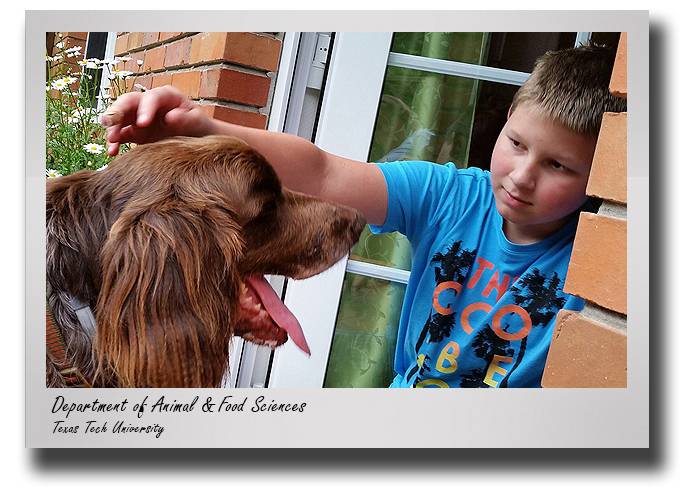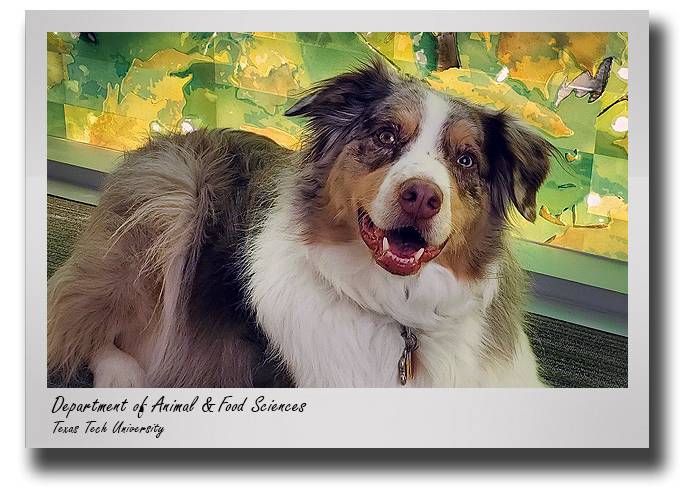AFS’s Protopopova seeks assistance with autism research and dogs
By: George Watson
 Research has demonstrated that the introduction of a dog into the learning environment
of children with autism spectrum disorder (ASD) can increase social behavior, a key breakthrough in helping these children develop
and maintain social relationships.
Research has demonstrated that the introduction of a dog into the learning environment
of children with autism spectrum disorder (ASD) can increase social behavior, a key breakthrough in helping these children develop
and maintain social relationships.
Little is known, however, about the exact mechanism behind why a pooch can break through with children with autism. But a pair of Texas Tech University scholars hope to find out, and they need the public's help.
Sasha Protopopova, an assistant professor of companion animal science in Texas Tech's Department of Animal & Food Sciences, and Wes Dotson, director of the Burkhart Center for Autism Education and Research in the College of Education, recently received a grant from the National Institutes of Health to investigate why and how therapy dogs can help children with ASD in the learning environment.
 Along with graduate research assistant Paige Dotson, the researchers will conduct a clinical trial with children on the autism spectrum
disorder in hopes of identifying the mechanisms by which dogs increase group social
behavior, if and how repeated exposure to the dog influences social behavior, and
the effects of the dog on the therapist.
Along with graduate research assistant Paige Dotson, the researchers will conduct a clinical trial with children on the autism spectrum
disorder in hopes of identifying the mechanisms by which dogs increase group social
behavior, if and how repeated exposure to the dog influences social behavior, and
the effects of the dog on the therapist.
"There are two hypotheses we're going to explore," Protopopova said. "One is that dogs have a stress-ameliorating effect, so they decrease stress in the children, and by decreasing stress, now the children are capable of absorbing this new information and learning. The second hypothesis is that of dogs as a non-judgmental learning partner. When you're trying to learn, especially some social skills, and you have a human partner you're trying to learn with, that human partner may be judging you and may be giving you some kind of aversive feedback. The dog is just going to be this non-judgmental audience, so you can practice more comfortably."
To conduct this research, though, Protopopova and Dotson are seeking participants from the public. Children from ages 11 to 17 who have either been diagnosed with ASD or are suspected of having autism are eligible to become part of the study. The study will enroll a total of 72 children.
"We're hoping to start recruitment in a couple of weeks," Dotson said. "You don't have to have a formal diagnosis when you come to us, and if you don't, as part of the research team, we actually have someone who will confirm the diagnosis with a diagnostician."
 Children who participate in the study will be put into one of three groups. Each group
will include eight children and will be part of a 10-week group social skills instruction
program for children with ASD. In each class, either the first five weeks will involve
a therapy dog, the last five weeks will involve a therapy dog or no therapy dog will
be involved for the entire 10-week period, which would be ideal for children who are
allergic or have an aversion to dogs.
Children who participate in the study will be put into one of three groups. Each group
will include eight children and will be part of a 10-week group social skills instruction
program for children with ASD. In each class, either the first five weeks will involve
a therapy dog, the last five weeks will involve a therapy dog or no therapy dog will
be involved for the entire 10-week period, which would be ideal for children who are
allergic or have an aversion to dogs.
Protopopova and Dotson have recruited an Australian Shepherd named Finley, who is owned by a clinician in the Burkhart Center. Finley will be the only dog used in the project in order to assure responses to the therapy dog are consistent.
Therapists will teach courses repeatedly across all three cycles of the program with different children, each rotating through each condition. Researchers will measure social behavior, stress behavior, heart rate, electrodermal activity and salivary cortisol concentrations of both children and therapists. They will also measure the direction of children's social behavior towards the dog and their peers and the changes in quality of instruction of therapists during dog-inclusive and dog-exclusive sessions.
The hope is that results will lead to significant enhancements in current interventions for individuals with ASD.
"There's going to be a lot of data collection in this study because we're testing multiple hypotheses, and also because it's just a complex issue," Dotson said. "We're going to be looking at things like the child's proximity to other peers and to the dog, and social initiations toward the dog, toward the therapist and toward peers. We're going to be looking at the presence of stress behaviors in the person, so we'll have physiological devices they're wearing to see if there is galvanic skin response showing physiological arousal at different points during the work."
Protopopova has conducted research similar to this in her time at Texas Tech, using therapy dogs to see if they improved academic task performance in ASD children. This project will examine the effect on social behavior.
"What came out of the sequence of studies was that if you provide a dog continuously in the session, it is a distraction, much like if you put a TV on; the children were happy to hang out with a dog rather than do academic work," Protopopova said. "But within that data, even though we didn't set out to look for social behavior, we did actually see an increase in social behavior while the dog was continuously present. So, when the dog is there, it's a distraction from academic work, but you still see an increase in social behavior, and this is a very important finding with our target population given that social behavior is often limited in children with ASD. We really need to focus on the social behavior as well as academic skills."
Those who are interested in their child participating in this research also can find more information during the annual Walk for Autism Awareness on April 28 at the John Walker Soccer Complex.
CONTACT: Michael Orth, chairman, Department of Animal and Food Sciences, Texas Tech University at (806) 834-5653 or michael.orth@ttu.edu
0412NM19 / Editor's Note: If you're interested in having your child become part of the study, contact Paige Dotson at (806) 834-2834 or paige.dotson@ttu.edu
Davis College NewsCenter
-
Address
P.O. Box 42123, Lubbock, Texas 79409-2123, Dean's Office Location:Goddard Building, Room 108 -
Phone
(806)742-2808 -
Email
kris.allen@ttu.edu
